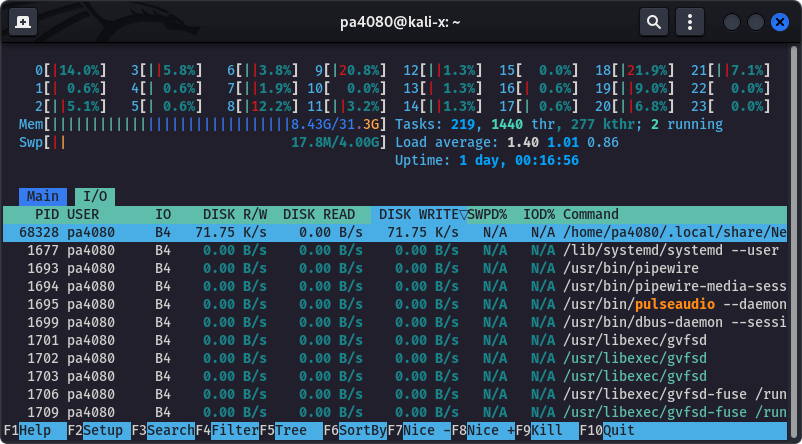Linux I/O Monitoring and Analyze: Difference between revisions
From WikiMLT
| Line 9: | Line 9: | ||
<syntaxhighlight lang="shell" line="1"> | <syntaxhighlight lang="shell" line="1"> | ||
sudo apt install htop | sudo apt install htop | ||
</syntaxhighlight>Install the latest version of <u><code>htop</code></u> <u>3.2.1-1</u> on <u>Ubuntu</u> Server <u>22.04.1</u> from a [https://packages.debian.org/bookworm/htop .deb package].<syntaxhighlight lang="shell" line="1"> | |||
cd /tmp | |||
wget --no-check-certificate https://http.us.debian.org/debian/pool/main/h/htop/htop_3.2.1-1_amd64.deb | |||
sudo apt install ./htop_3.2.1-1_amd64.deb | |||
</syntaxhighlight>To be able to see all data in most cases you need to run the tool as root:<syntaxhighlight lang="shell" line="1"> | |||
sudo htop | |||
</syntaxhighlight> | </syntaxhighlight> | ||
| Line 15: | Line 22: | ||
}} | }} | ||
== | == References == | ||
... | |||
* Htop: [https://github.com/htop-dev/htop GitHub] | [https://htop.dev/index.html Home page] | |||
* | |||
<noinclude> | <noinclude> | ||
Revision as of 16:27, 28 August 2022
There is a couple of tools available that allows you to monitor and analyze the disk I/O performance of your Linux driven system. Here are listed few of them and also how to install and examples of their basic usage.
Htop 3.2+
If the latest version of htop is available at your distribution, there is available an additional tab that shows the I/O metrics of the instance – Screen 1. Here is how to check the available version and install htop.
sudo apt show htop 2>/dev/null | grep '^Version'
sudo apt install htop
Install the latest version of htop 3.2.1–1 on Ubuntu Server 22.04.1 from a .deb package.
cd /tmp
wget --no-check-certificate https://http.us.debian.org/debian/pool/main/h/htop/htop_3.2.1-1_amd64.deb
sudo apt install ./htop_3.2.1-1_amd64.deb
To be able to see all data in most cases you need to run the tool as root:
sudo htop
Screen 1. The new I/O Metrics tab of 
htop (v 3.2+). Use Tab to switch to the I/O tab, then use F6 to open the Sort by menu, and sort by IO_WRITE_RATE. The screenshot is taken on Kali Linux 2022. 
References